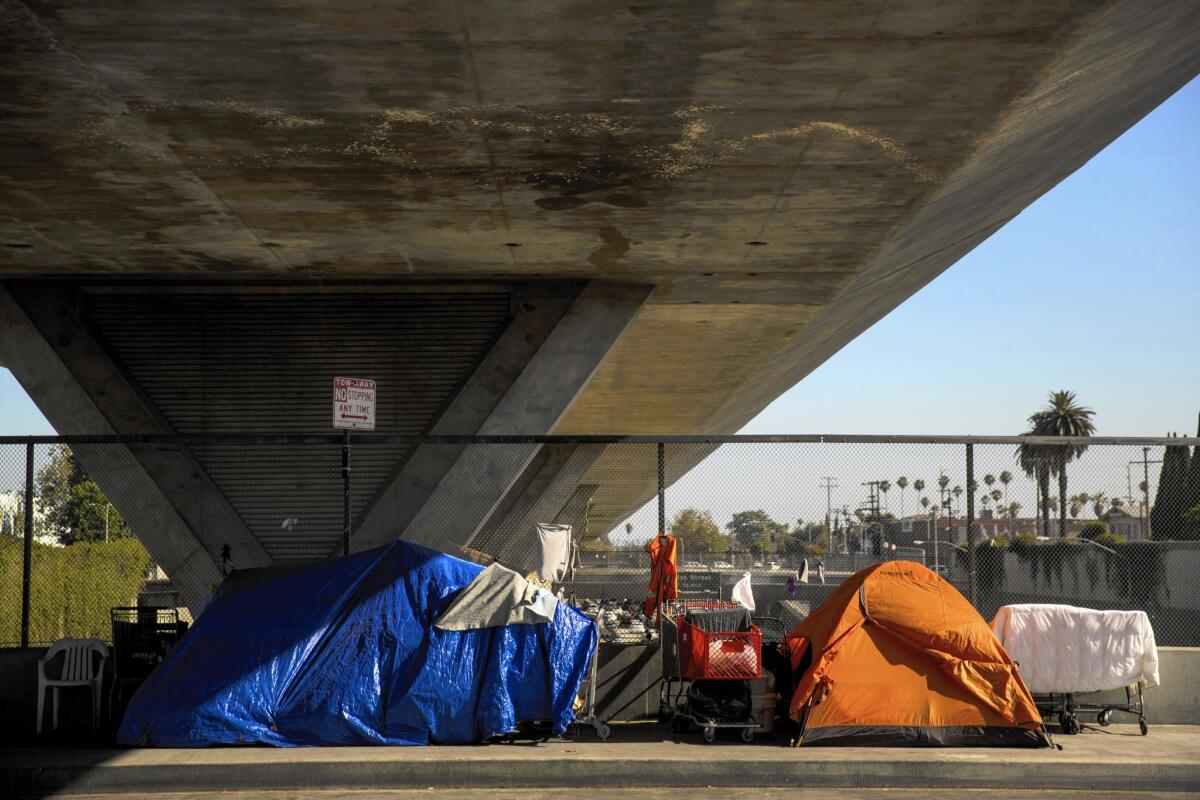To combat virus, L.A. will let homeless encampments stay up throughout the day

- Share via
The Los Angeles City Council voted Tuesday to temporarily stop enforcing a law requiring tents to come down during daytime hours, saying the change is needed to limit the spread of the novel coronavirus.
Councilmen Mike Bonin, Marqueece Harris-Dawson and Gil Cedillo said the city must “urgently reevaluate” its policies for dealing with homeless encampments, given the virus threat.
By ensuring homeless Angelenos can remain in their tents, the city will reduce their chances of being around others and contracting the virus, said Bonin, who represents coastal neighborhoods.
“The only thing that is worse than having lots of people living in encampments is throwing them out of encampments and making them more vulnerable,” he said.
Council members also voted to instruct city agencies to begin providing hand-washing stations, portable toilets, dumpsters, vermin-proof trash cans and weekly shower service at “major” homeless encampments. But they rejected a plan to stop confiscating the belongings of homeless Angelenos that exceed 60 gallons.
Bonin, Cedillo, Harris-Dawson and Councilman Herb Wesson favored such a move. The council’s other 11 members, led by Councilman Joe Buscaino, voted to continue confiscating such items.
“There are tons of trash in and around different parts of the city of Los Angeles that I am very concerned about,” said Buscaino, who represents a Watts-to-San Pedro district. “That is adding to filth and disease.”
One business leader expressed relief that the council rejected the plan to stop confiscating belongings, saying such a move would have increased the spread of rats and disease in homeless encampments.
“We cannot make this health emergency any worse by allowing this accumulation to grow even larger,” said Estela Lopez, executive director of the Central City East Assn., a downtown business group.
Los Angeles has about 36,000 homeless people, more than 27,000 of them unsheltered, according to the the Los Angeles Homeless Services Authority.
Under the city’s current laws, tents on sidewalks and in other public areas must come down between 6 a.m. and 9 p.m. In many parts of the city, the rule is not vigorously enforced.
Homeless advocates described the council’s decision to keep tents and encampments in place throughout the day as a much-needed health and safety measure.
“The worst thing we can do is push people outside” of their tents, said Mel Tillekeratne, main organizer for the #SheDoes movement, which advocates for shelter for homeless women. “This is giving them a space to stay, rather than moving around in the community.”
Tuesday’s action still preserves the city’s authority to require homeless residents to move their tents so that sanitation crews can clean sidewalks and remove hazardous materials, said Bonin spokesman David Graham-Caso.
The tent proposal was one of several emergency measures discussed at Tuesday’s council meeting, the first since City Hall was closed to the public in an effort to limit the spread of the coronavirus.
Council members also voted to impose new measures to shield tenants from evictions and seek new protections for workers at Los Angeles International Airport and elsewhere.
County officials have not identified any cases of COVID-19 among the homeless population so far, said Heidi Marston, interim executive director of the homeless services authority. When that happens, emergency management officials plan to have motels, hotels and other sites where they can be placed in isolation, she said.
Public health officials have also advised that homeless residents who are living in tents should be allowed to “shelter in place” in the coming weeks, Marston said.
“Obviously, if they want to go to a shelter we will facilitate that too,” she said. “But they should not, in those circumstances, be told to take their tent down, especially if they’re wanting to stay there, or exhibiting symptoms [where] they would need to have that tent remain up.”
Councilman Bob Blumenfield, who represents the west San Fernando Valley, told Marston he is “extremely nervous” about that approach.
“Someone sheltering in place in an encampment is a recipe for the entire encampment to come down with the virus,” he said.
The proposal backed by the council would still require removal of tents that are within 10 feet of an operable driveway or if they block access for wheelchair users. It would also instruct city agencies to begin providing 24-hour access to restrooms at city libraries, parks, recreation centers and other public facilities.
The city will receive a report on the costs of providing those bathrooms — and adding more services at encampments — later this month, Graham-Caso said.
Theo Henderson, who lives in a park in Chinatown, said the move to allow tents to stay up during the day should continue even after the threat from COVID-19 has subsided.
Allowing unhoused residents to maintain their tents, he said, would protect them against other health threats.
Homeless people “are not just 18-to-24-year-olds with perfect health,” said Henderson, who hosts the podcast “We The Unhoused.”
More to Read
Sign up for Essential California
The most important California stories and recommendations in your inbox every morning.
You may occasionally receive promotional content from the Los Angeles Times.













